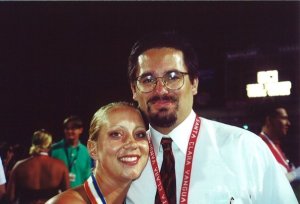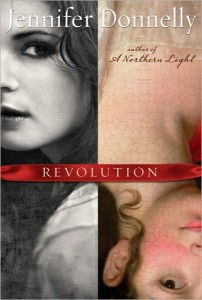When I was 17 & a senior in High School I became pregnant. Needless to say it was a very hard time for me. I completely lost sight of who I was. Everything that I thought made me (music, drama, dance, High School) was being replaced by things foreign (adulthood, mothering). Top off a bit of post-partum depression & recovering eating disorders and you have a little mess on your hands.
Fast forward a year later and I hit a low point. I was beyond depressed and I tried to cope by taking an entire package of NightQuill. Lucky for me, this doesn’t put you in the endless sleep I desired, but instead just makes you really drunk-like. It was at this point that I got advice from the mother of a good friend of mine. She was able to put into words why I was having a hard time & her suggestion was to join the Santa Clara Vanguard.
Really? This made no logical sense to me. A teenage mother doesn’t just ship her daughter off to her mother’s house so she can tour around the country with a Drum & Bugle Corp. It’s not appropriate. It’s not responsible. And it was exactly what I needed to do.
 After speaking to my parents, we rationalized that it was common for children to spend extended vacations with their grandparents. Besides they knew I needed to rediscover myself & drum corp seemed the perfect prescription for depression – LOTS OF EXERCISE (12 hours running around a football field), LOTS OF SUNSHINE & VITAMIN D (did I mention 12 hours running around a football field?), ROUTINE, LITTLE TIME FOR DRAMA, & MUSIC, DANCE, PERFORMING.
After speaking to my parents, we rationalized that it was common for children to spend extended vacations with their grandparents. Besides they knew I needed to rediscover myself & drum corp seemed the perfect prescription for depression – LOTS OF EXERCISE (12 hours running around a football field), LOTS OF SUNSHINE & VITAMIN D (did I mention 12 hours running around a football field?), ROUTINE, LITTLE TIME FOR DRAMA, & MUSIC, DANCE, PERFORMING.
However, beyond all this SCV gave me something a little extra…they embraced me whole-heartedly for what I was and NEVER ONCE judged me. Since becoming pregnant, I received looks & comments from complete strangers because I was a teenage mother. The SCV family did none of this. I was just another family member and was treated as such.
One of my fondest memories was in 2000 during my age-out year. I had just gotten off the phone with my mother and she was having a rough time juggling the needs of my daughter and the needs of my grandmother. I was in tears because I was in New Jersey, my mother & daughter were in Arizona, & there was nothing I could do to help. Rick, the SCV director, came up to me and talked to me like I was another parent…not a 21 year old kid, but a parent. I don’t know if he even remembers this conversation, but I do. It was a perfect example of how SCV treats its own. They don’t judge. They don’t assume. Rick & others took me as is, built me up, and loved me.
 This is a wonderful, historical fiction novel for the young adolescents. It is a short story (only 161 pages) about a thirteen year old boy named Samuel and his experiences at the start of the Revolutionary War.
This is a wonderful, historical fiction novel for the young adolescents. It is a short story (only 161 pages) about a thirteen year old boy named Samuel and his experiences at the start of the Revolutionary War.

